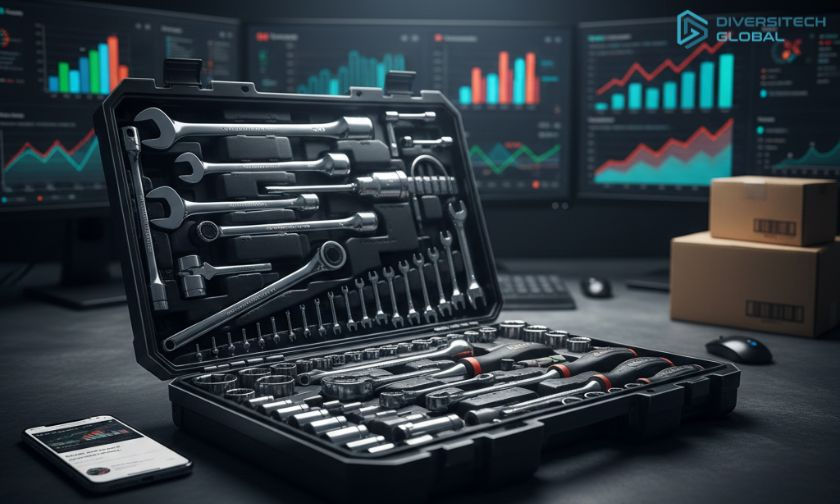Private Label Tools Increase Consumer Options and Accessibility
- Diversitech Global

- Feb 7, 2024
- 5 min read
Updated: Feb 22, 2024

The world of DIY tool hardware has experienced a significant transformation in recent years with the rise of private label tools. Private label tools, also known as store brand or house brand tools, are products manufactured by one company and sold under the brand name of another company. This concept has revolutionized the industry by increasing consumer options and accessibility to quality tools at affordable prices. In this article, we will delve into the impact of private label tools on the hardware retail sector, the significance of increased consumer options, and the accessibility they provide.
Table of Contents:
1. The Emergence of Private Label Tools
Private label tools have gained popularity due to several key factors:
Cost-effectiveness: Private label tools are often priced lower than branded tools, making them more affordable for consumers on a budget.
Quality control: Many private label tool manufacturers prioritize stringent quality control processes to ensure that their products meet or exceed industry standards.
Customization: Retailers have the opportunity to customize private label tools to align with their target market and branding.
These factors have contributed to the emergence and growth of private label tools as a viable option for consumers.
2. Increased Competition in the Hardware Retail Sector
The availability of private label tools has led to intensified competition among hardware retailers. Here's how it has impacted the sector:
Differentiation: Retailers can differentiate themselves from competitors by offering unique private label tool lines that are not available elsewhere.
Pricing Strategy: Private label tools often provide higher profit margins for retailers compared to branded tools, allowing them to remain competitive in pricing while maintaining profitability.
Brand Loyalty: By developing a strong private label tool brand, retailers can build customer loyalty and drive repeat business.
The rise of private label tools has forced hardware retailers to adapt their strategies and offerings to stay ahead in the highly competitive market.
3. Expanded Product Selection
Private label tool lines have led to an expanded product selection for consumers. Here's how it benefits them:
Diverse Options: Private label tools often provide consumers with a wider range of choices, allowing them to find products that suit their specific requirements and preferences.
Niche Market Catering: Private label tool lines often include specialized tools that cater to niche markets or particular DIY projects, offering consumers more tailored solutions.
Pricing Accessibility: The affordability of private label tools makes it easier for consumers to access quality tools without breaking the bank.
The expansion of product selection through private label tools empowers consumers with more options and flexibility in their purchasing decisions.
4. Quality Assurance and Affordability
Private label tool manufacturers understand the importance of maintaining quality assurance while offering affordable options to consumers:
Quality Control: Private label tool manufacturers implement rigorous quality control processes to ensure that their products meet or exceed industry standards.
Cost-effectiveness: Private label tools are designed to be affordable without compromising on quality, making them a desirable option for consumers.
Warranty Coverage: Retailers often provide warranties on private label tools, offering consumers peace of mind and protection against defects or malfunctions.
The focus on quality assurance and affordability enhances consumer trust and satisfaction in private label tools.
5. Collaboration with DIY Communities
Private label tool manufacturers and retailers often collaborate with DIY communities to foster engagement and loyalty:
Sponsorship and Partnerships: Manufacturers and retailers sponsor DIY events, workshops, and online communities, providing tools and resources for DIY enthusiasts.
Customer Feedback: Private label tool brands actively seek feedback from DIY communities to improve their products and address specific needs.
Educational Content: Manufacturers and retailers create educational content, such as tutorials and guides, to support and empower DIY enthusiasts in their projects.
The collaboration with DIY communities strengthens the bond between private label tool brands and their target audience, fostering a sense of community and loyalty.
Want to incorporate sustainability into your craft & art tool kits & double your sales? Get in touch
6. Impact on Established Brands
The rise of private label tools has posed challenges to established brands in the following ways:
Pricing Pressure: Private label tools often offer comparable quality at lower prices, putting pressure on established brands to adjust their pricing strategies.
Differentiation: Established brands must differentiate themselves through unique features, superior quality, or brand reputation to justify higher price points.
Competition for Shelf Space: As private label tool lines expand, established brands face increased competition for shelf space in hardware retail stores.
Established brands must adapt their strategies to stay competitive in the evolving landscape influenced by private label tools.
7. Consumer Perception and Trust
Private label tools have gained consumer trust and positive perception in the following ways:
Positive Experiences: Consumers who have had positive experiences with private label tools are more likely to recommend them to others, contributing to positive word-of-mouth marketing.
Online Reviews: The availability of online reviews and ratings for private label tools allows consumers to make informed decisions based on the experiences of others.
Brand Reputation: Private label tool brands that consistently deliver quality products and excellent customer service build a strong reputation and earn the trust of consumers.
The trust and positive perception of consumers towards private label tools have contributed to their growing acceptance and market share.
8. Global Manufacturing and Sourcing
Private label tools have also had a significant impact on global manufacturing and sourcing practices:
Manufacturing Partnerships: Many hardware retailers establish partnerships with manufacturers, often located in countries with lower production costs, to produce their private label tools.
Supply Chain Efficiency: Private label tools have driven improvements in supply chain management, including streamlined processes and optimized logistics, to ensure timely delivery and cost-effective sourcing.
Global Market Reach: Private label tool brands have expanded their market reach by sourcing products from manufacturers worldwide, allowing them to tap into international markets and cater to diverse consumer needs.
The global manufacturing and sourcing practices associated with private label tools have resulted in increased efficiency and market opportunities for both retailers and manufacturers.
9. The Future of Private Label Tools
The future of private label tools looks promising, with several trends and developments on the horizon:
Innovation and Technology Integration: Private label tool brands are likely to invest in research and development to introduce innovative features and integrate technology into their products.
Sustainability and Eco-Friendly Initiatives: Private label tool manufacturers will focus on developing environmentally friendly products and implementing sustainable manufacturing practices.
Online Retail and E-Commerce: Private label tools are expected to gain further traction in the online retail and e-commerce space, as consumers increasingly turn to online platforms for their purchasing needs.
As the industry evolves, private label tools will continue to play a significant role in shaping the DIY tool hardware market.
Empowering Consumers with Quality and Choice
Private label tools have emerged as a game-changer in the DIY tool hardware industry, offering consumers increased options and accessibility to quality tools at affordable prices. The availability of private label tool lines has expanded product selection, fostered competition among hardware retailers, and driven innovation in manufacturing and sourcing practices.
Through collaborations with DIY communities and a focus on quality assurance, private label tool brands have earned consumer trust and positive perception. As the industry continues to evolve, private label tools are poised to shape the future of the DIY tool hardware market, empowering consumers with a wide range of choices and the ability to tackle their projects with confidence.
Related Article: Impact of Private Labeling in the Tool Industry
Want to incorporate sustainability into your craft & art tool kits & double your sales? Get in touch




Comments